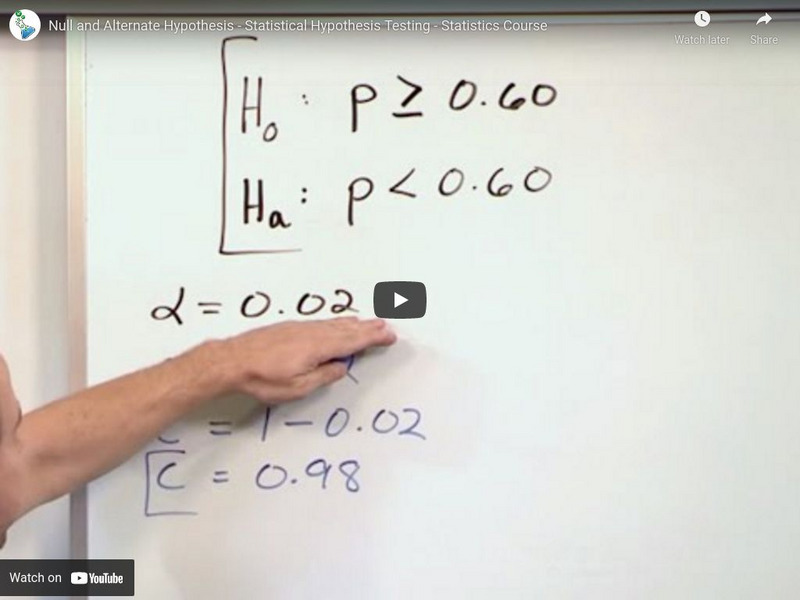Hi, what do you want to do?
Laura Candler
Time Capsule
It's amazing how much kids change from the beginning of the year to the end. Create a written account of their growth with a fun worksheet that involves children recording information about themselves at two points...
National Education Association
Finding Slope of a Line
Teaching slope is part of the foundation for graphing equations. This video starts at the beginning and introduces the types of slope before calculating with the slope formula. On a graph, your learners will see that every line has a...
Scholastic
Study Jams! Choosing the Correct Graph
With so many types of graphs, don't let your learners get stuck figuring out which one to use. To track how Zoe spent her allowance, use this interactive lesson to review all the types of graphs and pick the best one to display the data....
Scholastic
Study Jams! Measure Length
Mia's pet lizard has grown a lot since he was a baby and she needs help measuring his length now that he's an adult. After choosing the best tool for the job, RJ goes step by step through the measurement process, modeling how to use both...
National Education Association
Use Graphs and Tables to Represent Real World Situations and Solve Problems
There may be a right answer, but there isn't one right way to solve the problem. This video goes through a word problem and solves it in three ways: algebraically, numerically, and graphically. Go step by step as the narrator explains...
Virtual Nerd
What is the Opposite, or Additive Inverse, of a Number?
Teach your class about the additive inverse! Using examples first and a definition second, this video explains what the additive inverse it and how to find the additive inverse of any given number or variable. A quick concept review for...
Virtual Nerd
How Do You Solve a Proportion?
Use the means extreme proportion property to cross multiply and solve for the unknown variable in this proportion problem. Then use the division property of equality to isolate that variable and get your solution.
Virtual Nerd
What are Quadrants in the Coordinate Plane?
The teacher diagrams a coordinate plane and identifies the four quadrants. He labels the quadrants with numbers. Then he illustrates a table to identify the positive or negative value of the x-coordinate and the y-coordinate and...
Virtual Nerd
How Do You Use a Proportion to Find a Part of a Whole?
There are two methods for finding the percentage of a number. One is to use an equation, and the other is to use a proportion. This tutorial demonstrates with clear examples how to implement the proportion method. Insert this video into...
CK-12 Foundation
Midpoints and Segment Bisectors: Lesson
Let's meet in the middle. As part of a comprehensive playlist on basic geometry, the video introduces the definitions of a midpoint and segment bisector. The resource shows a graphical approach to finding the midpoint of a line segment...
Virtual Nerd
What is Absolute Value?
As long as you keep in mind that there is no such thing as negative distance, then you will know the meaning of absolute value. The teacher writes on a white board to explore integers on a number line, give a definition of absolute...
Virtual Nerd
How Do You Use a Proportion to Find What Percent a Part is of a Whole?
Percent, parts, whole, how do these pieces fit together to solve a percent problem? Follow along as the instructor shows how to set this up as a proportion problem in order to solve it.
Massachusetts Institute of Technology
Mit: Blossoms: Guess the Last Ball: An Exercise in Mathematical Modeling
This video lesson uses the technique of induction to show students how to analyze a seemingly random occurrence in order to understand it through the development of a mathematical model. [41:24]
Khan Academy
Khan Academy: Statistics: Hypothesis Testing and P Values
Video gives example of hypothesis testing with an example related to medical testing. Includes setting up a null hypothesis and an alternative hypothesis. [11:26]
Khan Academy
Khan Academy: Statistics: Hypothesis Test for Difference of Means
Video demonstration of setting up a hypothesis test and calculating whether the difference of sample means of an experiment falls within a 5% significance level and using that to determine whether to accept or reject the null hypothesis....
Khan Academy
Khan Academy: Hypothesis Testing With One Sample
T-Statistic Confidence Interval (for small sample sizes)
Khan Academy
Khan Academy: Hypothesis Testing With One Sample
Hypothesis testing with One-Tailed and Two-Tailed Tests
Other
Math Counts Foundation: Probability With Geometry Representations
This video focuses on probability with geometry representations. Links to an activity sheet and the solutions also available.
Other
Math Snacks: Number Rights
Whole numbers are no better than any others! Practice plotting values on the number line as a passionate activist rises up and demands equity for all numbers, including fractions and decimals. A teaching guide with printable resources is...
Curated Video
Math Tutor Dvd: Calculate the P Value in Statistics
In this lesson, you will learn about the very important topic of p-values in statistics. The p-value is a calculation that you make during hypothesis testing to determine if you reject the null hypothesis or fail to reject it.
Curated Video
Math Tutor Dvd: Null and Alternate Hypothesis: Statistical Hypothesis Testing
Learn how to write the null and alternate hypothesis as part of a hypothesis test in statistics. This video will show several examples so that the student gains an understanding of how to work hypothesis testing problems step-by-step....
Curated Video
Math Tutor Dvd: Intro to Hypothesis Testing in Statistics
The student will learn the big picture of what a hypothesis test is in statistics in this video. Items discussed are terms such as the null hypothesis, the alternate hypothesis, statistical significance of a hypothesis test, and more....



























